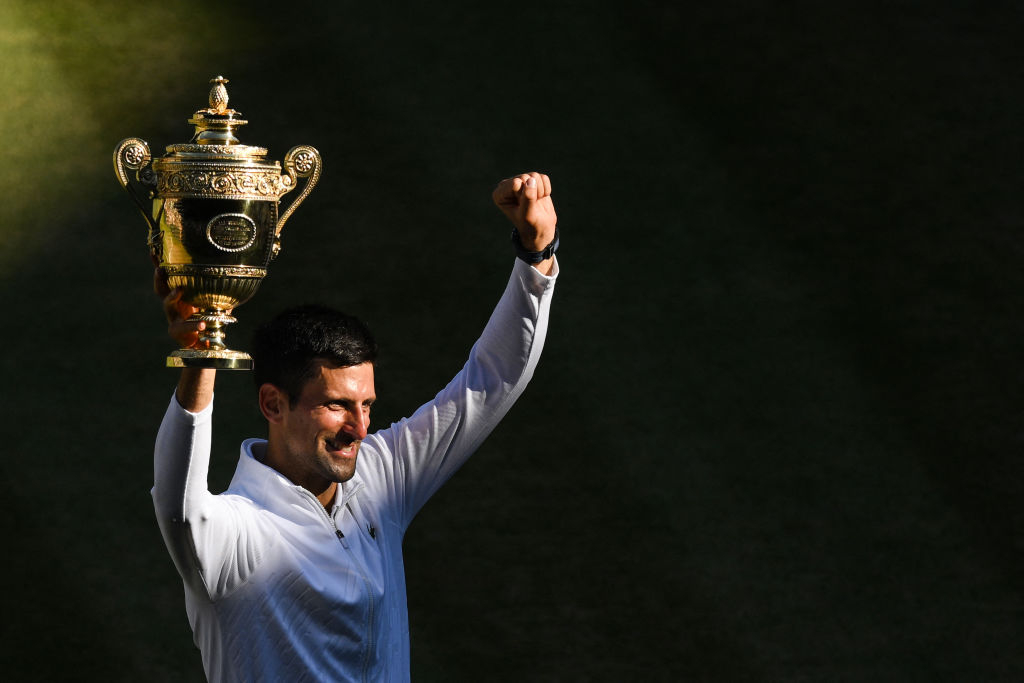
As his opponent lost his cool around him all afternoon at Wimbledon, Novak Djokovic just played tennis. Djokovic, the world’s number one player, remained a mechanical hitting machine, slicing drop shots, returning difficult serves, as Australian Nick Kyrgios shouted at himself, at his team sitting in a courtside box, and at the chair umpire. Kyrgios, as he is prone to do, began to unravel after winning the first set, and although he kept his playing level high, Djokovic pounced. He won his seventh Wimbledon title, 4-6, 6-3, 6-4, 7-6 (3), tying Pete Sampras for second-most men’s single titles at the tournament; they’re both one behind Roger Federer, who has eight. Djokovic passed Federer, however, on the all-time majors list: he now has 21, one ahead of Federer’s 20, and one behind Rafael Nadal’s men’s record, 22.
Djokovic stands alone.
The match featuring two of best but most reviled players on tour — Djokovic for his refusal to receive a Covid-19 vaccination, Kyrgios for his sometimes boorish behavior— turned in the second set, when Djokovic was up 5-3, and serving to win the set. Kyrgios, however, won the first three points of the game, and had a triple break point. But he squandered the opportunity, and refused to forgive himself. He began yelling at his team, beating himself up for blowing it, and in turn, beating them up verbally. Kyrgios, who was making his first finals appearance at a Grand Slam, couldn’t control his temper on the biggest stage in his sport. Djokovic won that set, and didn’t lose another on the way to his fourth straight Wimbledon title.
In the third set, Kyrgios was serving at 4-4, and went up 40-0. He couldn’t stay focused and Djokovic broke him, before winning his next service game and going up 2-1 in sets. At a changeover, Kyrgios again began shouting towards his box across the Wimbledon grass, in a mostly quiet stadium: the occupants of the Royal Box, which included Prince William, Kate Middleton and their son Prince George—in his Wimbledon debut—are no doubt unaccustomed to such impolite behavior. At another point, Kyrgios pushed the chair umpire to eject a fan whom he insisted was drunk and distracting him.
Despite the histrionics, Kyrgios, to his credit, kept his serve strong: he finished with 30 aces, to Djokovic’s 15. He struck more winners than his opponent, 62 to 46. But Kyrgios also finished with almost twice as many unforced errors as Djokovic: 33 to 17. He fought hard on the fourth set: neither player could break the other’s service, before the set moved to a tiebreaker. Kyrgios double faulted on the first tie-breaker point and continued to make errors, and chirp, throughout: Djokovic went up 6-1, and it seemed over before it started. Moments later, Djokovic clinched the match.
Afterwards, Kyrgios was in pretty good spirits, complimenting Djokovic on the court at the victory presentation. “He’s a bit of a God,” Kyrgios said. He then thanked the ball boys and girls and chair umpires, acknowledging he had a “tough relationship” with them at times. The crowd properly guffawed. What to make of Kyrgios? His talent is undeniable, and he finally pushed through his self-sabotaging enough to make a Grand Slam final. He’s still only 27, and it’s not difficult to picture more runs like these in his future. His unpredictability during matches can make Kyrgios appointment viewing: in this sense, Kyrgios is an undeniable benefit for the sport. There’s no one else like him.
But dark clouds so often follow him. During this Wimbledon run, news broke that he faces a court date in Australia next month after he allegedly assaulted a former girlfriend late last year.
And does he want to be a great player? When asked, after the Wimbledon final, whether he wanted to advance this far in a major event again, Kyrgios responded “absolutely not,” citing exhaustion. He was being somewhat jokey, but the comment spoke to his conundrum: is the sweat and effort required to win a major worth it to Kyrgios?
If it’s not, that’s perfectly fine. Tennis fans would be robbed of his sometimes thrilling play, but Kyrgios owes tennis fans nothing. They should just bet on him at their own risk.
Djokovic, as great as he is, also has his complications. He acknowledged after the match that the year has taken an emotional toll on him, that he doesn’t enjoy being villainized. He’s brought controversy upon himself in refusing the COVID-19 vaccine. The Australian government sent him home in January for failing to comply with its mandate; he couldn’t defend his Australian Open title (Nadal won it instead). At Wimbledon, Djokovic might have won his last major tournament of the year. His unvaccinated status could prevent Djokovic from traveling to the U.S. to play in the U.S. Open. With Nadal facing injuries and Federer clearly near the end, Djokovic, whose game clearly remains in top form—with no evidence to suggest it will trail off any time soon—remains the favorite to finish out his career with the Grand Slam record.
But the world may never love him for it.
More Must-Reads From TIME
- The 100 Most Influential People of 2024
- The Revolution of Yulia Navalnaya
- 6 Compliments That Land Every Time
- What's the Deal With the Bitcoin Halving?
- If You're Dating Right Now , You're Brave: Column
- The AI That Could Heal a Divided Internet
- Fallout Is a Brilliant Model for the Future of Video Game Adaptations
- Want Weekly Recs on What to Watch, Read, and More? Sign Up for Worth Your Time
Write to Sean Gregory at sean.gregory@time.com